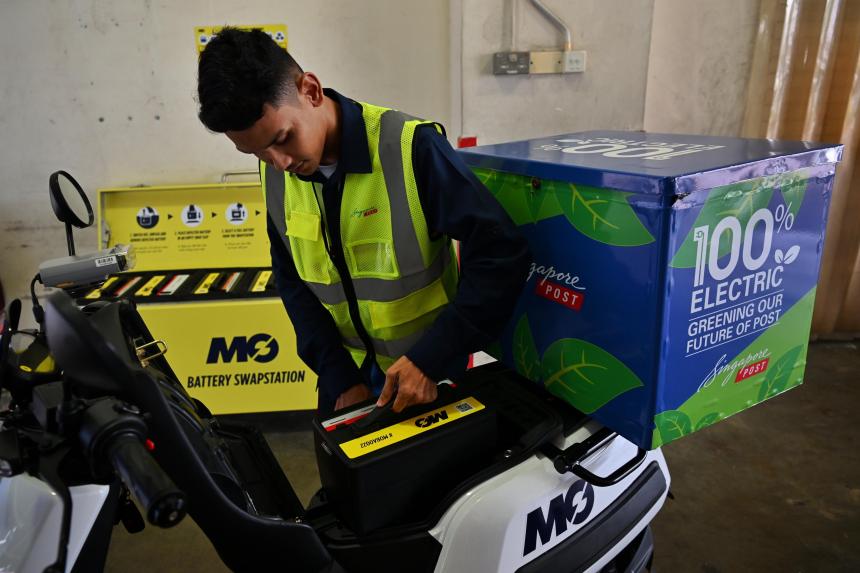SINGAPORE – The first two electric motorcycles with battery swopping technology hit the road on Monday for a three-month trial for Singapore Post mail deliveries.
Putting a spin on the term “e-mail”, these electric vehicles will be delivering letters in Districts 9 and 10, covering areas such as Newton, Orchard, Tanglin and Bukit Timah.
Being able to swop spent rechargeable batteries for fresh ones enables the electric motorcycles to be kept in continuous use, as it means they do not have to be plugged to a charger for hours. Fresh batteries can be loaded in less than three minutes, so the motorcycles have virtually no downtime.
The motorcycles, batteries, and charging and storage equipment come from Mo Batteries, a Singapore firm specialising in electric motorcycle fleet management.
This is the first on-road trial for electric motorcycles with battery swopping technology since Mo Batteries received permission for such trials from the Land Transport Authority (LTA) last September. The permit is valid for 12 months.
Each motorcycle is powered by two batteries, which each take up to five hours to charge. The charging is done at Mo Batteries’ facility in Commonwealth Avenue and transported to SingPost.
Mo Batteries co-founder Tom Streitberg explained that the firm decided to use a centralised charging set-up – as opposed to charging the batteries at SingPost’s facility in Kallang – to reduce the complexity of the process. He said this made it easier to roll out the trials while providing the highest level of safety during charging.
The company’s charging facility was set up according to the strict standards of LTA, he said.
SingPost said a mail delivery route would cover about 50km a day, which is well within the range of about 100km that each electric motorcycle can manage.
The locations of the two electric motorcycles and the batteries, and how they are used, are being logged and studied as part of the trial.
SingPost said the motorcycles will be assessed for their charging convenience, ease of use, maintenance and energy efficiency.
Ms Neo Su Yin, Singapore chief executive of SingPost, said the trial with Mo Batteries is an important part of the delivery service provider’s plan to operate a fully electric fleet by 2026. SingPost said around 15 per cent of its motorcycle fleet is now electric. It also operates other vehicles, including vans, which are in the process of going electric.
In 2021, SingPost tested two electric three-wheel scooters and two electric vans as part of its plans to electrify its fleet of lighter vehicles. It was reported then that it would be converting its petrol-powered fleet of 700 motorcycles and scooters and 140 vans into electric ones.

Besides SingPost, Mo Batteries will also be trialling its technology with security companies Prosegur and Certis, transport and delivery giant Grab, and statutory board Sentosa Development Corp.
Unlike electric cars and vans, most electric motorcycles, being physically smaller, are not able to carry batteries that are big enough to give them sufficient operating range in between charging. Swoppable battery technology is seen as a viable solution to keep the electric motorcycles constantly mobile.
Electric motorcycle manufacturers have developed their own battery swopping systems. The batteries, connectors and software interface are usually unique to each maker.
For battery swopping technology to be commercially viable in Singapore, the type of batteries used will have to be standardised to achieve the economies of scale needed for businesses to set up swopping stations across the island, said Singapore Motor Cycle Trade Association president Rex Tan.
Besides Mo Batteries, a test licence was granted to a partnership between Gogoro, a Taiwanese battery swopping technology company, and investment company Jardine Cycle & Carriage. Gogoro’s concept involves battery swopping stations which can charge batteries on-site. Jardine C&C confirmed that trials are on track to be launched in early March.


